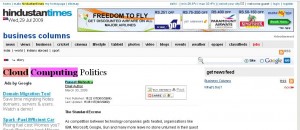
Published in HindustanTimes on March 30th 2009
The Standard Excuse
As competition between technology companies gets heated organizations like IBM, Microsoft, Google, Sun and many more leave no stone unturned in their quest to dominate the market. In a free market everything seems fine as long as your customers are happy with the value you are delivering. Yet in this mayhem of corporate battleground there is something called a “standard” and it seems to be the latest missile tech giants are using against each other.
Tech Companies and the standards’ politics
Wikipedia defines a technical standard as an established norm or requirement. It is usually a formal document that establishes uniform engineering or technical criteria, methods, processes and practices. For example when you buy an ISI product you can be sure of the quality or an ISO standard means a certain set criteria are being observed in manufacturing. Similarly the tech industry has its own standards. Call it the maturity of the technology industry that it has reached a stage when companies are pushing for Open Standards where formats are available and developers can add applications or maybe even modify and do many other innovations.
Microsoft versus IBM, Sun and others
In the last few years it is the politics of standards that is being witnessed. Top tech giants fighting it out. Two years ago I covered the much heated OXML standards debate when Microsoft was pushing its docx against stiff competition from IBM, Sun, Google and many more. From Governments to standard bodies to ISO and many other international bodies everyone got embroiled in one of the most heated standards debate. Ofcourse Microsoft had the last word and oxml is indeed a standard now. Now it’s the turn of cloud computing and the players are IBM, Microsoft, Google, Amazon and more.
Cloud Computing and its importance
Cloud computing, said to be the next big thing in the tech industry is the latest target of bad politics. Let’s understand what really makes it so big. Cloud computing means services and software can be accessed over a network. So while the “real” software resides on a cloud, you are able to access it on your computer and work on it as if it was on your computer.
In the last couple of years cloud computing has turned into a huge money runner. Take the case of ERP. Earlier if an organization wanted an ERP solution the starting cost was Rs.10 lac upwards. Now you can get an ERP solution for as less as Rs.3,000 and that too from the biggest tech giants like Oracle, Microsoft, Sap and more. Oracle calls it On Demand, Microsoft calls it software plus services. Companies like Salesforce have had this software as a service model from their start. Most of Google’s ammunition is fired around this model and noteworthy is within 9 years of its start this startup has become the biggest competitor for the world’s biggest technology company Microsoft.
The point is cloud computing is the future, cloud computing is where a lot of future tech developments depend. Imagine if tomorrow we actually have a cloud computing based model for an operating system! If that sounds laughable do watch out for this space in the coming weeks with some really great information around this.
The Politics of Cloud Computing
This time it was IBM which supposedly led a coalition of trying to push something called a “Open Cloud Manifesto.” Microsoft’s Steve Martin supposedly “prematurely revealed” this manifesto and the coalition it termed as “shadowy group of IT industry companies.” Amazon too joined forces and rejected it. Amazon rejection is understandable considering Amazon’s EC2 and S3 APIs are almost like defacto standards. Google and Salesforce, perhaps the biggest players in cloud computing also joined Microsoft and Amazon.
The Cloud Computing Manifesto contains a “public declaration of principles and intentions” for cloud computing providers and vendors, annotated as “a call to action for the worldwide cloud community” and “dedicated belief that the cloud should be open”. It follows the earlier development of the Cloud Computing Bill of Rights which addresses similar issues from the users’ point of view.
The Last Word
Rising above the politics its absolutely great news that the industry finally agrees on “open” standards. Microsoft which for long was a packaged software company has transformed itself well for the next technology wave. Microsoft opening its .doc standards was a step in the positive direction and perhaps so was the OXML standard. The current “manifestogate” controversy will soon subside. Sooner of later the industry will have to agree on a set of standards for something that can redefine the biggest tech wave of this decade. It’s great to see Google and Microsoft on the same side.
Puneet Mehrotra writes on business and technology for HindustanTimes email: puneet@tbe.in
